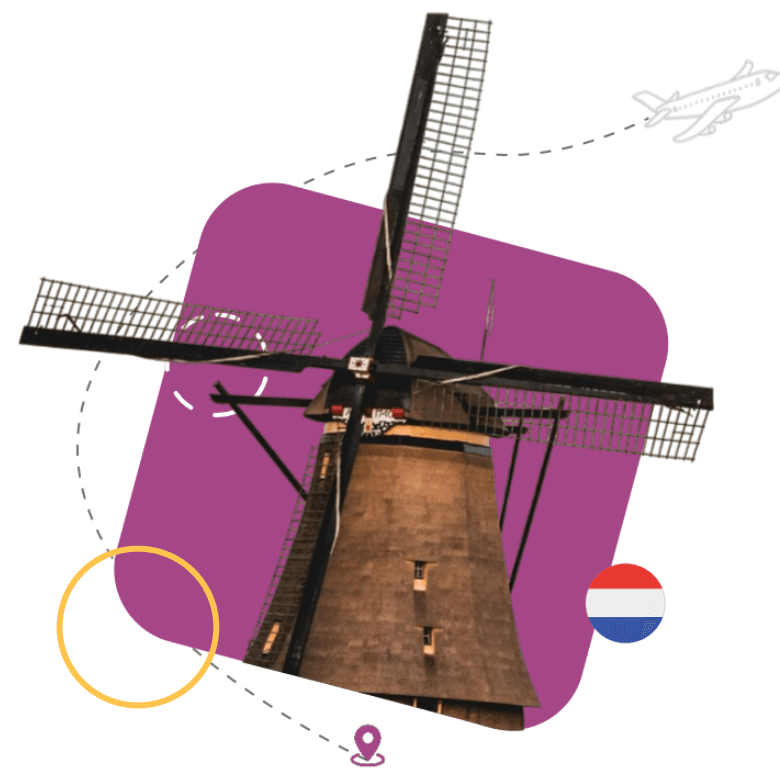STUDY ABROAD
Study In Netherland


Why study in the Netherlands
The Netherlands stands out as a top destination for international students, offering a highly professional education system focused on practical problem-solving. With over 1500 short-term and 400 long-term courses available in Dutch universities, students have a wide range of options to choose from. Renowned for its English-taught programs in fields like astronomy, medicine, science, management, and engineering, the Netherlands attracts thousands of international students annually, including many from India. Students can apply for either a short-term or long-term student visa depending on their course duration, and the country allows international students to work part-time to cover daily expenses
Benefits of Studying in the Netherlands
Affordable Costs
Both the cost of living and the cost of education are relatively affordable compared to other study destinations, making it accessible for students from diverse backgrounds.
Work-Study Balance
The Netherlands allows students to work part-time while studying, providing valuable work experience and helping to offset living expenses.
Renowned Universities
The Netherlands is home to prestigious, top-ranking universities renowned for their academic excellence.
Welcoming Environment
Known for its open and inclusive culture, the Netherlands welcomes students from around the world, fostering a supportive and diverse community.
International Hub
As the home to many international organizations and multinational companies, the Netherlands offers a dynamic environment for students interested in global affairs and business.
Career Opportunities
Students can expect excellent career growth prospects, with opportunities for internships, networking, and job placements within the vibrant Dutch job market.

Study Intakes in the Netherlands
The Netherlands accepts 2 study intakes: fall and spring.
| Intake | Study Program | Admission Deadlines |
|---|---|---|
| Spring | Undergraduate and Postgraduate | September |
| Fall | Undergraduate and Postgraduate | February |
The university intake varies depending on the course of study and duration. The following table shows the Netherlands intakes for graduate and master’s degree courses.
| Higher Study Options | Duration | Intake Months | Deadline to Apply |
|---|---|---|---|
| Bachelors | 3 - 4 Years | Sep (Major) & Feb (Minor) | 6-8 months before the intake month |
| Masters (MS/MBA) | 2 Years |

Top Universities in the Netherlands
Here are some of the top universities in the Netherlands according to the QS World University Rankings 2024
Cost of studying in the Netherlands

In the Netherlands, tuition fees at public universities apply to all international students, regardless of their nationality. However, students from the EU/EEA, Switzerland, and Suriname typically pay lower tuition fees compared to non-EU/EEA students.
These tuition fees are often categorized as “Statutory” for EU/EEA students and “Institutional” for non-EU/EEA students. Statutory fees are subsidized by the government, making them lower, while institutional fees are higher because they are not subsidized.
On average, EU/EEA students can expect to pay between 1,040 and 2,083 EUR/year for Bachelor’s programs and between 1,070 and 2,083 EUR/year for Master’s programs. For non-EU/EEA students, these fees are higher, ranging from 6,000 to 15,000 EUR/year for Bachelor’s programs and 8,000 to 20,000 EUR/year for Master’s programs.
The maximum costs for a degree in the Netherlands can reach up to 19,400 EUR/year for Bachelor’s programs and 52,000 EUR/year for Master’s programs, especially in fields like Business Management or Communication and at private universities.

Netherlands scholarships
| University | Scholarship Amount (in EUR) |
|---|---|
| Orange Knowledge Programme in the Netherlands | € 2,500 - € 3,600 |
| Leiden University | 3,000 - 5,000 |
| Erasmus University Rotterdam | 5,000; 10,000 or 15,000 |
| University of Twente | 3,000 - 5,000 |
| Radboud University | 3,000 - 5,000 |
| Utrecht University | 5,000; 10,000 or 15,000 |
| Vrije Universiteit Amsterdam | 3,000 - 5,000 |
| Tilburg University | 3,000 - 5,000 |
| Justus & Louise van Effen Excellence Scholarships | Complete Tution Fee |
| Maastricht University NL High Potential Scholarships | 13,260 |
Educational Requirements to Study in the Netherlands
| Higher Study Options | Minimum Educational Requirement | Minimum Required Percentage | IELTS/PTE/TOEFL Score | Backlogs Information | Other Standardized Tests |
|---|---|---|---|---|---|
| Bachelors | 12 Years of Education (10+2)/ 10+3 years of diploma | 60% | Overall, 5.5 in each band | Up to 10 backlogs (some private universities may accept more) | NA |
| Masters (MS/MBA) | 3/4 Years of Graduate Degree | 60% | Overall, 6.5 with no band less than 6 |
Netherlands Student Visa Eligibility
To study in the Netherlands, you’ll need a Provisional Residence Permit (MVV), which serves as an entry visa for both short-term and long-term study programs. If your stay exceeds three months, you must also apply for a residence permit (VVR) alongside your entry visa. This permit allows you to remain in the country for the duration of your course and can be extended for an additional three months if necessary.


Netherlands Student Visa Eligibility Checklist
Here’s a checklist of the requirements for a Netherlands student visa
- Completed visa application form
- Academic transcripts from previous studies
- Copies of travel and medical insurance policies
- Comprehensive study plan outlining academic history and future study interests
- Details of visa application fee payment
How to apply for a Netherlands Student Visa?
Follow these simple steps to register for the Netherlands student Visa

Check Your
Eligibility
Check your eligibility to apply for the Netherlands Visa.

Gather Required Documents
Gather all the required documents.

Apply
Online
Apply for a Netherlands visa online.

Await
Approval
Wait for the approval status.

Travel to the
Netherlands
Once approved, make arrangements to travel to the Netherlands for your education.
Netherlands Student Visa Fees and Processing Time
The cost of a Netherlands student visa varies depending on the type and duration of the visa. For a Schengen visa, the fee typically ranges from €80 to €150. However, students from Azerbaijan, Armenia, and Russia may pay around €35 to €60 for the visa. For a long-term student permit in the Netherlands, the fee is approximately €207 to €300. Additionally, if any documents are missing or damaged, there may be an additional charge of €142 to €180.
As for processing time, it can take anywhere from 30 to 120 days to obtain a Netherlands student visa. Delays may occur if all required documents are not provided. Nevertheless, the Netherlands boasts a high visa success rate of 98% and is known for its efficient visa processing system. Applicants are advised to monitor the status of their visa application after submission.


Netherlands Post-Study Work Visa
After completing their bachelor’s or master’s degree from an accredited Dutch University, students are eligible to apply for a Residence Permit for the ‘Orientation Year,’ also known as the Netherlands Post Study Work Visa. This visa allows them to stay in the Netherlands for one year to search for employment opportunities related to their field of study.
Under new regulations effective from March 1, 2016, students must apply for the Netherlands post-study work visa within three years of completing their degree program. For example, if you completed your bachelor’s, master’s, or research work in 2016, you have until 2019 to apply for the permit, giving you the opportunity to live and work in the Netherlands while seeking suitable employment.
FAQs
Frequently Asked Questions
How do I apply for universities in the Netherlands?
To apply to Dutch universities, you typically need to create an account on the university’s website, complete the online application form, and submit the required documents, including academic transcripts, language proficiency test scores, and a motivation letter.
What are the language requirements for studying in the Netherlands?
Most universities in the Netherlands offer programs taught in English. However, non-native English speakers may need to provide proof of proficiency through tests like IELTS or TOEFL. Some programs may also require Dutch language proficiency.
Are there scholarships available for international students in the Netherlands?
Yes, there are various scholarships available for international students, offered by the Dutch government, individual universities, and external organizations. These scholarships can help cover tuition fees and living expenses.
Can international students work while studying in the Netherlands?
Yes, international students in the Netherlands are allowed to work part-time while studying. They can work up to 16 hours per week during the academic year and full-time during scheduled holidays. However, certain restrictions may apply depending on nationality and visa status.
What are the accommodation options for international students in the Netherlands?
Accommodation options for international students in the Netherlands include university-owned dormitories, private student housing, shared apartments, and homestays. It’s essential to start looking for accommodation well in advance, as the demand can be high, especially in major cities.







